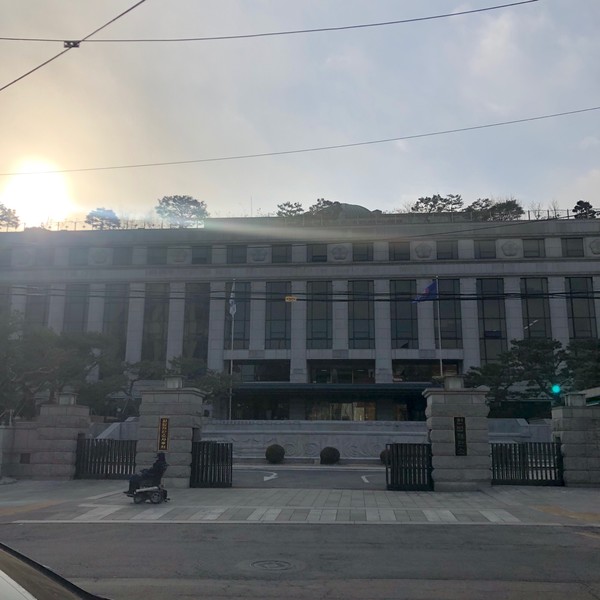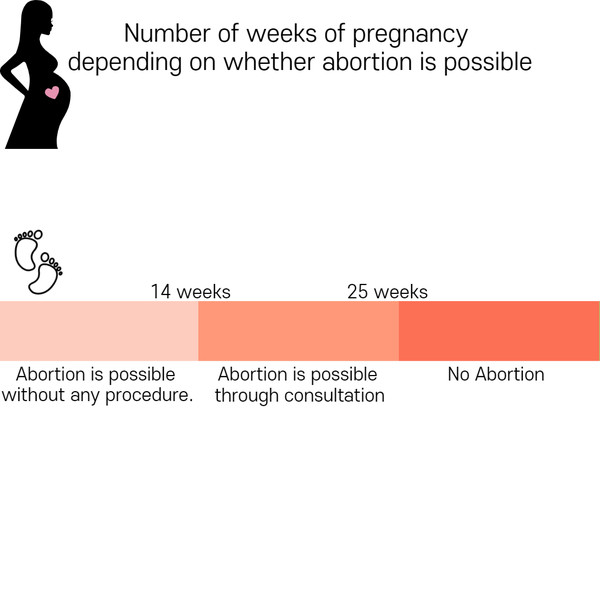
Abortion was abolished in 2021, and there is currently a legislative vacuum regarding this issue. In April 2019, the Constitutional Court of Korea made an unconforming decision against what is stated in paragraph 1 of Articles 269 and 270 of the Criminal Law of the Constitution that incriminated women who terminated their pregnancy as well as the doctors who assisted in the same. There was a grace period for new legislation or for conducting social discussions until December 31, 2020. Despite the one-year and eight months period, the National Assembly failed to introduce an alternative bill. Eventually, only legal provisions pertaining to criminalizing abortion-related activities lost effect this year without any proposed alternatives. Abortion is no longer a crime. However, there are no subsequent laws and policies, and social consensus has not been reached properly.
In October 2020, the Ministry of Justice and the Ministry of Health and Welfare made a pre-announcement of legislation for the Criminal Act and the Child Health Act. It was about maintaining abortion as a criminal offense. Abortion is possible for up to 14 weeks of pregnancy without any procedures. Until 15-24 weeks of pregnancy, abortion is permitted if the continuation of the pregnancy causes social or economic distress for the women. Currently, this amendment to abortion laws is a major social issue, and various criticisms and opinions prevail. Pregnant women and gynecologists remain confused because there are still no properly defined laws.

The amendment does not reflect the purpose of the Constitutional Court’s decision.
Some believe that the government interpreted the Constitutional Court’s decision too conservatively, narrowly, and reflected it in the amendment. Abortion falls under a criminal law that punishes the involved parties, and the parties are bound to be limited to women who have had abortions. Despite this, limiting the number of weeks of pregnancy cannot change the current structure, allowing women to take responsibility for abortion. The Lawyers for a Democratic Society said that the government understood the core of the Constitutional Court’s decision to set the scope of criminal punishment based on the number of weeks of pregnancy. They criticized that the purpose of the Constitutional Court’s decision was to establish laws and systems that guarantee women’s rights to live safely and healthily without being discriminated against by pregnancy and childbirth.
Resistance and confusion of the medical community
Obstetricians and gynecologists are the most confused, with no legislation still in place on abortion. According to the obstetrics and gynecology departments, abortion is possible within less than 10 weeks pregnant. The period up to 22 weeks is considered a period for women to carefully consider and decide. However, these opinions were not reflected in the amendments. Therefore, in the absence of legal devices, the medical community is implementing “selective abortion rejection” by drawing up its own guidelines to minimize confusion. Four organizations, including the Korean Society of Obstetrics and Gynecology, have advised doctors to perform unconditional abortions only if they are less than 10 weeks pregnant. They also recommended that if the fetus is more than 22 weeks old, it should not be aborted because it is likely to survive after being taken out of the woman’s womb. Furthermore, they argue that abortion laws specifying the right of a doctor to refuse abortion should be guaranteed. They also claim the legitimacy of doctors’ refusal to perform an abortion on the grounds of conscience and work ethics. However, a doctor’s right to refuse treatment can be toxic for a woman who has decided to have an abortion after thorough consideration.
Until recently, people raised various objections and criticisms over the details of the amendment and validity of the bill.
Those who still oppose the abolition of abortion
Currently, abortion is virtually abolished. However, there still are people who argue that abortion laws should remain. The Catholic Bishops’ Conference of Korea claims that abolishing abortion laws violate the constitution by compromising the obligation to protect the fetus’ right to life. They also say that if the abolition of abortion laws deprives a fetus of its right to life, it would translate to abandoning the dignity of human life and the state’s responsibility to protect the weak. Acts for Prolife, an anti-abortion civic group, argues that no fetus survives the 14-week standard, considering that most abortions in Korea are conducted within 12 weeks of pregnancy. They say that if women’s health and human rights are considered, the government should make efforts to prepare policies and budgets for such babies and women.
The movements of college students against abortion
College students have various opinions on the abolition of abortion. The “Declaration of 1.6 million People: Abolition of Abortion National University Students Joint Action” is national joint action solidarity created by college students who are angry about the legislative notice of abortion. In December, they used buses to protest against abortion. Buses with the words “abolish the abortion law altogether” traveled around Seoul for six days. They also picketed crosswalks to announce the need to abolish abortion. They argued that by abolishing abortion laws completely, the government should respect women’s right to make decisions about everything pertaining to their bodies and that the government should also introduce overall reforms to ensure women’s rights. The university student association club, “Everyone’s Feminism,” also held a protest last year calling for the complete abolition of abortion and held a press conference. They strongly criticized the Constitutional Court for trying to uphold the criminalization of abortion, even though the Constitutional Court made an unconforming decision against the constitution.
Canada, which abolished abortion in 1988, provided abortion as a medical service. Each state operates a state-run medical insurance system, and women can receive free surgery at hospitals and clinics if they have medical insurance. Doctors provide free abortion pills to pregnant women who are less than nine weeks pregnant. New Zealand, which abolished abortion last year, provides information on abortion through the Ministry of Health and Welfare’s website. It provides information on which hospitals can have abortions by region and within how many weeks of pregnancy the hospital would willingly operate upon. In Korea, with abortion laws abolished, laws and welfare systems should be prepared as soon as possible to guarantee women’s rights and safety without discriminating due to pregnancy.
International cases related to the Abortion Laws
According to the National Assembly Research Service, 61 countries, including the U.S., Spain, and the Netherlands, allow abortions but restrict the timing of possible abortions. Considering the socio-economic background, 13 countries, including Finland and Japan, are allowed to have abortions, while 59 countries are allowed to have abortions only in case of potential danger to the mother’s life and health. Among the countries that have set a possible abortion period, Belgium and Spain allow 14 weeks, Sweden allows 18 weeks, and Singapore and Britain allow abortion at the request of pregnant women until 24 weeks. Canada allows abortion entirely without any restrictions or requirements for the duration of pregnancy. France also passed an amendment in August 2019, extending the abortion period to cover the entire pregnancy period.
The movie about abortion- “Unplanned”
The UOS Times recommends the movie “Unplanned,” which is about abortion. It is based on the true story of Abby Johnson, who becomes pro-life after a traumatic experience that shook her eight years’ faith. The main character works as a counselor at the largest abortion clinic in the U.S. for the past eight years, and she also works with a sense of duty toward helping women who experienced abortion. However, her life changes completely after she enters the abortion room herself. When the surgical instrument touches her skin, the surprised fetus is shown moving desperately to avoid it, and within minutes, the fetus is sucked into an inhaler. She firmly believed that the 13-week-old fetus was still a cell, not a human being. However, after this experience, she felt great skepticism and shame. The film is not a solution to the problem but provides an insight into what the main character experienced and felt in person. Now that abortion is virtually abolished, The UOS Times hopes for everyone to watch this movie, which urges people to think about life and choose more wisely.

